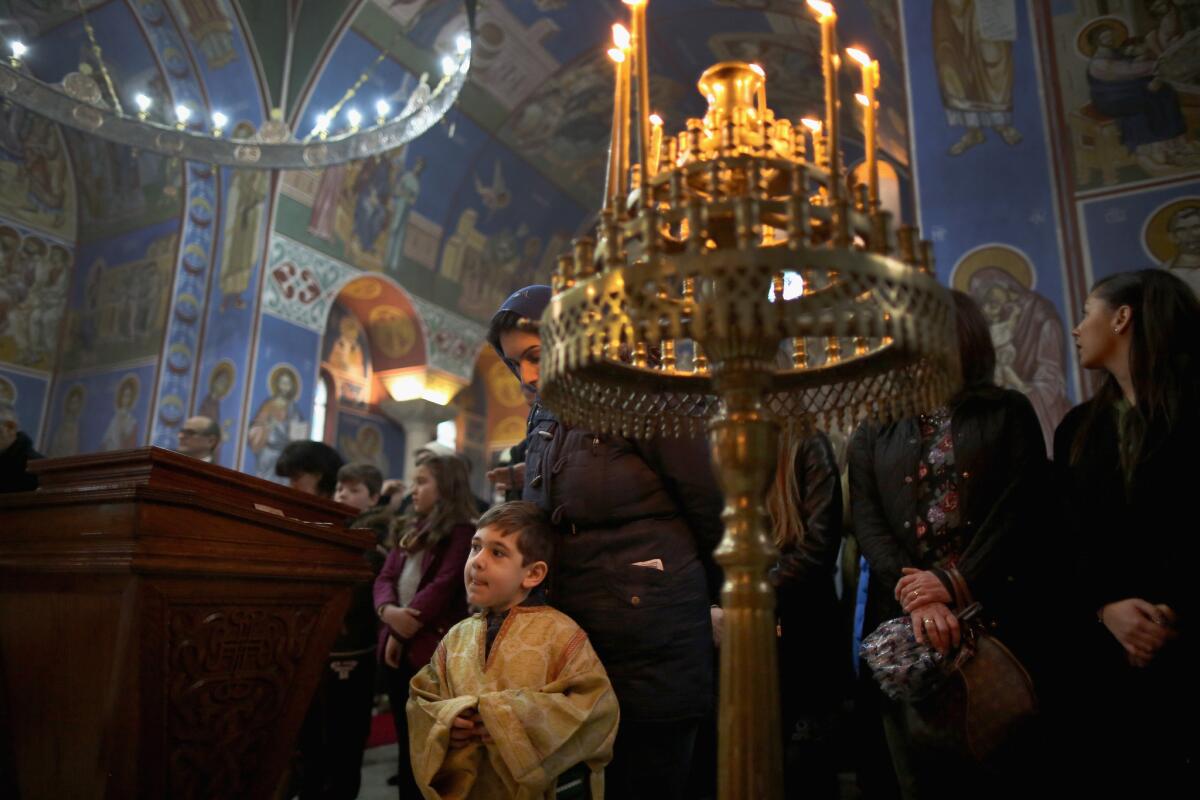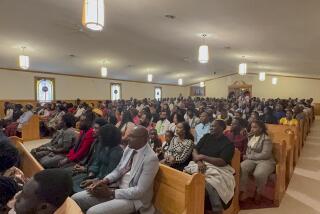Birmingham, England, a ‘no-go zone’? The diverse city says go on!

- Share via
Reporting from Birmingham, England — The white-capped minarets of Birmingham Central Mosque tower high in the air.
Beneath one, a large sign is clearly visible to motorists and passersby: “READ AL-QUR’AN, THE FINAL TESTAMENT.”
The dome in the center of the building, above a prayer hall that can fit at least 4,000 worshipers, is topped with a gold-colored crescent moon. It is an impressive and imposing sight, and if there were anywhere in this city that a non-Muslim might feel a little out of place, it is probably here.
But spend any amount of time in the neighborhood, called Highgate, and it becomes clear locals embrace their diversity rather than shy away from it.
“I was born and bred here, and when I was a young boy it was predominantly white, black and Irish,” said taxi driver Alan Gorman, 58, who is white. “Over the years the Asian community built up. But we’re all Brummies.”
“Brummie” is slang for residents of Birmingham, a central England city that unexpectedly came under scrutiny this month when Fox News commentator Steven Emerson branded it a “no-go zone” for non-Muslims.
“There are actual cities like Birmingham that are totally Muslim, where non-Muslims just simply don’t go,” he said on Fox.
Louisiana Gov. Bobby Jindal quickly picked up on the theme, describing in a CNN interview alleged “no-go zones” in European cities where Muslims refuse to assimilate.
Emerson and Fox News have since apologized, but not before his comments went viral and the hashtag #FoxNewsFacts started trending on Twitter as a way to ridicule the assertion.
Among the tweets: images of construction sites covered in tarp and jokingly referred to as burqa-clad Birmingham buildings. A popular bingo chain called Mecca was also mockingly used as evidence Islam had taken over the city.
“We found it funny,” Birmingham student Bilal Mussa, 17, said. “It was too stupid to find it offensive.”
Even Prime Minister David Cameron has weighed in, calling Emerson an “idiot.”
Birmingham, the second-largest city in Britain, has not always boasted the best reputation.
Brits joke that the M6 motorway around Birmingham is gridlocked because everyone is trying to get out. A recent BuzzFeed map of British stereotypes described Birmingham as a place full of “people who wish they didn’t live in Birmingham.”
In the mid-1980s, life here was rather bleak. The city lost 200,000 jobs — many in the declining automotive industry — and the unemployment rate averaged 25%, City Council Leader Albert Bore said.
But decades of careful planning, widespread construction and major investment have helped turn the city around. It was recently named the most entrepreneurial city in Britain outside of London and has started to attract major investors such as Deutsche Bank, which is about to expand and open an office in the downtown area.
Foreign tourism is also on the rise, having increased by 32% from 2012 to 2013. Birmingham has been named the most popular destination for Londoners looking to move out of the ever more expensive capital.
Yet for a brief moment on Jan. 11, the day Emerson made his comments, city officials were concerned that their efforts to improve the city’s reputation had been irreparably tarnished.
“That was the immediate worry,” Bore said. “It was all over the nation and international news.”
But such fears were short-lived.
“The way that Birmingham dealt with it was exceptionally good,” Bore said. “They used humor and irony.... It swept the issue away.”
That’s not to say that there is complete harmony in the city, which, according to 2011 census data, is 46.1% Christian, 21.8% Muslim, 3% Sikh and 2.1% Hindu. About 19% said they have no religious affiliation.
There have also been numerous terrorism-related arrests and a scandal last year involving hard-line Muslims seeking to assert control over a number of schools.
Still, there is an unmistakable pride about being a Brummie, and the Fox accusations appear to have brought people together.
In the pedestrian-only area in the city center Wednesday, the crowd was as diverse as in many major British cities.
Men and women of all ages and ethnicities rushed between shops, cafes and offices bundled up against the cold. A group of giggling schoolgirls in head scarves huddled around their phones at a bus stop, and men — some wearing turbans, others with hoods or baseball caps — strolled through the streets.
Pairs of community support officers, uniformed civilian members of the police force, walked around nonchalantly, engaged in quiet conversation.
Nearby, two women handed out leaflets next to a sign that read, “What does the Bible really teach?”
There was no sense of a city on heightened alert or restrictions of any kinds on non-Muslims.
“As a Birmingham community, Muslim and non-Muslim, we are open to all, multicultural, multifaith, multilinguistic,” said Imam Usman Mahmood, who leads prayers at Birmingham Central Mosque. “We are happy that at last a lot of us stood up together for that, and all of us were united.”
As a religious leader at the largest Islamic place of worship in Birmingham, and one of the largest mosques in Western Europe, Mahmood said that not only doubters would come and visit, but that he also had a message for the world:
“We are putting our words forward that this is a go zone for everyone.”
Boyle is a special correspondent.
More to Read
Sign up for Essential California
The most important California stories and recommendations in your inbox every morning.
You may occasionally receive promotional content from the Los Angeles Times.













